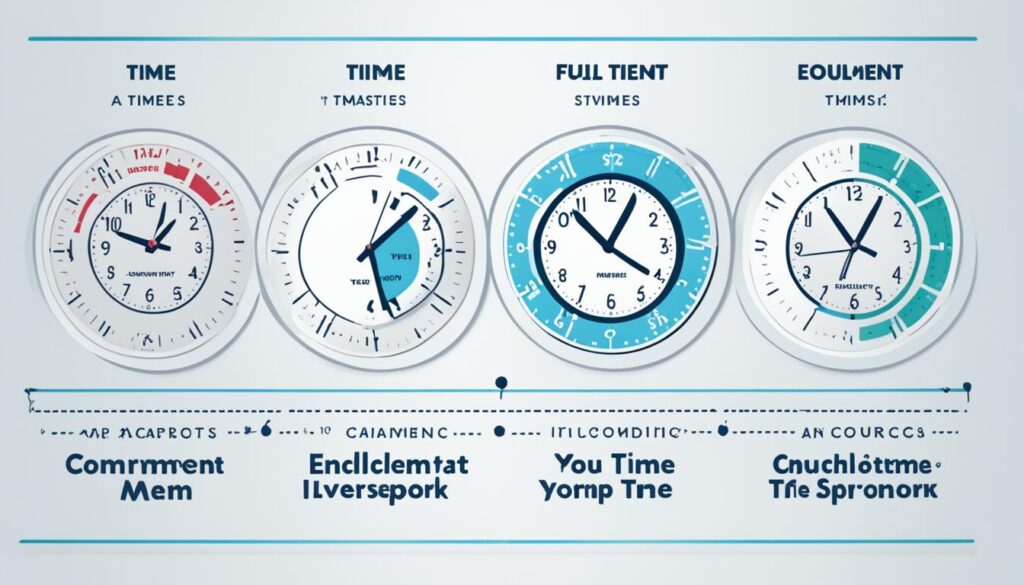Did you know that a 1 year Masters program typically takes anywhere from 12 to 18 months to complete? That’s right, in just a year or so, you can earn an advanced degree and enhance your career prospects. Compared to the average master’s program, which takes around 2 years to complete, a 1 year Masters offers a more expedited path to higher education.
Key Takeaways:
- A 1 year Masters program typically takes 12 to 18 months to complete.
- The duration may vary based on factors such as credit requirements, program flexibility, and delivery method.
- Online programs often offer more flexibility, allowing students to set their own pace of study.
- Full-time enrollment and accelerated programs can help students complete their degree faster.
- Considerations such as workload and desired specialization should be taken into account before pursuing a 1 year Masters program.
Factors Affecting the Length of a Masters Degree
The length of a master’s degree can vary depending on several factors that influence the duration of the program. These factors play a crucial role in determining how long it takes to earn a master’s degree and can greatly impact your educational journey.
Chosen Program and Field of Study
The program and field of study you choose for your master’s degree can affect its length. Certain programs are designed to be more intensive and may require additional coursework or specialized training, leading to a longer completion time. For example, a master’s degree in engineering or healthcare administration may have more extensive curriculum requirements compared to a general business degree.
Number of Credit Hours Required for Graduation
The number of credit hours required to graduate from a master’s degree program can significantly influence its length. Some programs have a set number of credit hours that must be completed, while others have a range of credits that can be customized based on your interests and goals. Programs with higher credit requirements may take longer to complete since they typically involve a more in-depth study of the subject matter.
Presence of a Thesis or Capstone Project
Master’s programs often require the completion of a thesis or capstone project as a culmination of your studies. These projects can take several months or even a year to complete, depending on the scope and complexity. The presence of a thesis or capstone project adds an additional factor that affects the overall length of your master’s degree.
Enrollment Status: Full-Time or Part-Time
Your choice of enrollment status, whether full-time or part-time, can significantly impact the length of your master’s degree. Full-time enrollment allows you to take a higher number of courses per term, accelerating your progress and enabling you to complete your degree faster. On the other hand, part-time enrollment allows for a more flexible schedule, accommodating other commitments but elongating the time required to finish the program.
Delivery Method of the Program: Online or In-Person
The delivery method of the master’s program also plays a role in determining its length. Online programs often offer more flexibility, allowing you to study at your own pace and potentially complete the coursework more quickly. In-person programs may have a more structured schedule, limiting the number of credits you can take per term and potentially extending the length of the program.
Personal Commitments and Desired Pace of Study
Additionally, your personal commitments and desired pace of study can impact the time it takes to earn a master’s degree. Factors such as work obligations, family responsibilities, and other commitments may require you to balance your studies and extend the length of your program. Your desired pace of study, whether you prefer to take a lighter course load or accelerate your progress, can also influence the total duration of your master’s degree.

Credit Requirements for a 1 Year Masters
When considering pursuing a 1 year Masters, it’s important to understand the credit requirements associated with the program. The number of credits needed to complete a 1 year Masters can vary depending on the specific program and university you choose. However, most master’s degree programs typically require between 30 to 60 credit hours.
These credit hours can be earned through a combination of core courses, electives, and any required thesis or capstone project. Core courses provide the foundational knowledge and skills necessary for your chosen field of study, while electives allow you to specialize and explore specific areas of interest. Additionally, thesis or capstone projects provide an opportunity for in-depth research and practical application of your learning.
It’s important to note that credit requirements may differ between institutions and fields of study. Some programs may have additional credit requirements, while others may offer credit transfers for relevant coursework completed in a prior degree or professional experience.
To give you a better understanding of credit requirements, let’s take an example. Imagine you are pursuing a 1 year Masters in Psychology. The program requires a total of 36 credit hours, consisting of 24 credit hours of core courses, 6 credit hours of electives, and a 6-credit hour thesis project.
Whether you are considering a 1 year Masters in Business, Computer Science, or any other field, it’s important to research and carefully review the credit requirements of each program you are interested in. This will ensure that you have a clear understanding of the academic workload and can plan your study accordingly.

Program Flexibility and 1 Year Masters
When considering earning a 1 year Masters degree, program flexibility plays a crucial role in determining the feasibility of completing the degree within the desired timeframe. Online programs, in particular, offer greater flexibility, allowing you to tailor your coursework to fit your schedule and pace of learning. By offering shorter terms and accelerated course schedules, online programs provide the opportunity to complete your degree in a shorter timeframe.
With the flexibility of online programs, you have the option to take more courses per term or even study year-round, allowing you to progress more quickly towards your degree. By taking advantage of program flexibility, you can accelerate your learning and complete your 1 year Masters program in a time frame that aligns with your goals.
In contrast, in-person master’s programs often have a more rigid schedule, with fewer options for accelerated completion. These programs may have set class times and limited course offerings, making it challenging to complete the required coursework and graduate within one year.

Full-Time vs Part-Time Enrollment for a 1 Year Masters
The choice between full-time and part-time enrollment can significantly impact the duration of your 1 year Masters program. Let’s explore the differences between these enrollment options and how they can affect the pace of your accelerated master’s degree.
Full-Time Enrollment
Opting for full-time enrollment allows you to complete a higher number of credit hours per term. This intensive approach can expedite your journey towards earning your master’s degree within the 1 year timeframe. By dedicating yourself to full-time studies, you can fully immerse yourself in your coursework and complete the necessary requirements at an accelerated pace.
Full-time enrollment is particularly advantageous if you have the flexibility to prioritize your studies and commit to a more rigorous academic schedule. It’s important to keep in mind that the workload can be demanding, but the payoff of earning your master’s degree in a shorter timeframe can be well worth the effort.
Part-Time Enrollment
If you have other commitments such as work or family obligations, part-time enrollment may be a better fit for you. This option allows you to balance your studies with your existing responsibilities, providing the flexibility to manage your time effectively.
While part-time enrollment might require a longer time commitment to complete your degree, it offers the advantage of accommodating your personal circumstances and allowing you to maintain a more manageable workload. By pursuing your 1 year Masters on a part-time basis, you can ensure that your educational goals align with your other commitments, providing a harmonious balance between work, family, and academia.
Ultimately, the decision between full-time and part-time enrollment should take into consideration your personal circumstances, desired pace of study, and ability to handle the academic demands of an accelerated program. Whether you choose to dive into full-time studies or opt for a more flexible part-time approach, both paths can lead to the successful completion of your 1 year Masters.

Online vs In-Person Masters Programs
When considering pursuing a 1 year Masters degree, one of the crucial decisions you’ll have to make is whether to opt for an online or in-person program. Both options have their merits, but it’s essential to understand the benefits of online master’s programs in order to make an informed choice.
Flexibility and Personalized Pace
- Online programs offer a higher degree of flexibility, allowing you to set your own pace and complete coursework on a schedule that suits you. This flexibility enables you to work around your existing commitments, whether it’s a full-time job, family responsibilities, or other personal obligations. You have the freedom to study when and where it’s most convenient for you, making it easier to balance your studies with your daily life.
- This personalized pace empowers you to complete your master’s degree in a shorter timeframe. Online programs often offer accelerated course schedules, allowing you to take more courses per term or even study year-round, reducing the overall duration of your degree. This can be particularly advantageous if you’re looking to earn your advanced degree quickly and advance your career without disrupting your current life.
Consider Your Scheduling Constraints
- On the other hand, in-person master’s programs typically follow a more structured schedule. These programs may have fixed class times and fewer options for accelerating your degree. If you have strict scheduling constraints or prefer a more traditional classroom setting with face-to-face interactions and networking opportunities, an in-person program could be the right fit for you.
Ultimately, the choice between online and in-person programs depends on your personal preferences, lifestyle, and commitments. Each option offers its own advantages, so carefully consider what aligns best with your needs and goals.
Accelerated and Dual-Degree Programs for a 1 Year Masters
If you’re looking for a faster route to earning your master’s degree, accelerated programs and dual-degree programs are worth considering. These options can help you complete your studies in a shorter timeframe, allowing you to advance your education and career more quickly.
Accelerated Programs
Accelerated programs offer an efficient way to earn your 1 year Masters by combining your bachelor’s and master’s degree coursework. By overlapping the curriculum, these programs reduce the overall time required for completion. With careful planning and coordination between programs, you can streamline your educational journey and gain a competitive edge in the job market.
Dual-Degree Programs
Dual-degree programs provide another avenue for expediting your master’s degree. With a dual-degree program, you can pursue two master’s degrees simultaneously, saving time compared to earning each degree separately. While it requires dedication and focused effort, this option allows you to develop expertise in multiple fields and broaden your career prospects.
Accelerated and dual-degree programs offer accelerated pathways to earning a 1 year Masters, enabling you to achieve your educational goals more efficiently. Whether you choose to combine your bachelor’s and master’s degrees or pursue multiple master’s degrees simultaneously, these programs require careful planning and a commitment to academic excellence. Consider your career aspirations and personal circumstances as you evaluate the options available to you.
Considerations for Pursuing a 1 Year Masters
Before enrolling in a 1 year Masters program, there are several factors you should consider. The accelerated timeline of a 1 year program may require a higher workload and more intense coursework. The condensed nature of these programs means that you will need to be prepared to dedicate a significant amount of time and effort to your studies.
Assessing your ability to handle the academic demands of a 1 year Masters is crucial. Consider your current workload and commitments, both personal and professional. Will you be able to manage the increased workload while juggling other responsibilities? It is important to ensure that you have the necessary time and resources to fully commit to your studies.
Additionally, it is essential to evaluate the level of specialization you want to achieve through your master’s degree. Some 1 year Masters programs may offer a broader curriculum, while others may provide a more focused and specialized approach. Consider your career goals and the skills and knowledge you want to acquire through your degree.
Choosing a 1 year program that aligns with your desired specialization can help you maximize the benefits of your master’s degree. Whether you are seeking a career change or looking to deepen your expertise in a specific field, selecting a program that caters to your interests and goals is crucial.
By carefully considering these factors, you can make an informed decision about pursuing a 1 year Masters program. It is important to be realistic about your abilities and commitments, ensuring that you can handle the demands of an accelerated program. Additionally, aligning your choice of program with your specialization goals can help you make the most of your master’s degree.
Conclusion
Earning a 1 year Masters degree can be a game-changer for your education and career. With the opportunity to complete advanced coursework and gain specialized knowledge in a shorter timeframe, a 1 year program offers numerous benefits.
By enrolling in a 1 year Masters program, you can fast-track your way to a higher level of expertise and open doors to new career opportunities. The accelerated timeline allows you to save time and money while still achieving your educational goals.
However, it’s crucial to carefully evaluate program options and consider your personal goals and commitments before committing to a 1 year Masters program. Understand the program structure, credit requirements, and the level of specialization you want to achieve. Take into account your workload capacity and ensure that you have the necessary resources and support to succeed in an intensive, condensed program.
In summary, a 1 year Masters program offers a faster route to gaining an advanced degree, enhancing your knowledge, and boosting your career prospects. With careful consideration of your personal circumstances and goals, a 1 year Masters can be a rewarding investment in your future success.
FAQ
Q: How long is a 1 year Masters?
A: A 1 year Masters program typically takes 12 to 18 months to complete, depending on the university and program. The duration may vary based on factors such as credit requirements, program flexibility, and whether the program is offered online or in-person.
Q: What factors affect the length of a Masters degree?
A: The length of a master’s degree can be influenced by various factors. These include the chosen program and field of study, the number of credit hours required for graduation, the presence of a thesis or capstone project, enrollment status (full-time or part-time), and the delivery method of the program (online or in-person).
Q: What are the credit requirements for a 1 year Masters?
A: The number of credits required for a 1 year Masters can vary depending on the program and university. Most master’s degree programs typically require 30 to 60 credit hours, but some programs may have additional credit requirements. The credit hours can be completed through a combination of core courses, electives, and any required thesis or capstone project.
Q: How does program flexibility impact the length of a 1 year Masters?
A: The flexibility of a master’s program can significantly impact the time it takes to earn a 1 year Masters. Online programs often offer greater flexibility, allowing students to complete coursework at their own pace and offering shorter terms or accelerated course schedules. In-person programs may have a more rigid schedule and fewer options for accelerated completion.
Q: What is the difference between full-time and part-time enrollment for a 1 year Masters?
A: The choice between full-time and part-time enrollment can affect the length of a 1 year Masters. Full-time students typically complete a higher number of credit hours per term and can complete their degree in a shorter timeframe. However, part-time enrollment allows students to balance their studies with other commitments, such as work or family, and may require a longer time commitment to complete the degree.
Q: How does the delivery method (online vs in-person) impact the length of a 1 year Masters?
A: The delivery method of a master’s program, whether online or in-person, can impact the length of a 1 year Masters. Online programs often offer more flexibility, allowing students to set their own pace and complete coursework on their own schedule. In-person programs may have a more structured schedule and fewer options for accelerated completion.
Q: Are there accelerated and dual-degree programs for a 1 year Masters?
A: Accelerated programs and dual-degree programs can offer an expedited path to earning a 1 year Masters. Accelerated programs allow students to combine their bachelor’s and master’s degree coursework, reducing the overall time to completion. Dual-degree programs enable students to pursue two master’s degrees simultaneously, reducing the time it would take to earn each degree separately.
Q: What should I consider before pursuing a 1 year Masters?
A: Before enrolling in a 1 year Masters program, there are several factors to consider. The accelerated timeline of a 1 year program may require a higher workload and more intense coursework. Students should assess their ability to handle the academic demands of a condensed program and consider their personal and professional commitments. Additionally, students should evaluate the level of specialization they want to achieve through their master’s degree and ensure that a 1 year program aligns with their career goals.
Q: What are the benefits of earning a 1 year Masters?
A: Earning a 1 year Masters degree offers a quicker path to advancing one’s education and career. While the length of a master’s degree can vary based on several factors, including program structure and individual circumstances, a 1 year program can provide a more accelerated timeline for completing advanced coursework and gaining specialized knowledge. It’s important for prospective students to carefully evaluate program options and consider their personal goals and commitments before committing to a 1 year Masters program.
Source Links
- https://www.snhu.edu/about-us/newsroom/education/how-long-does-it-take-to-get-a-masters-degree
- https://www.coursera.org/articles/how-long-does-a-masters-degree-take
- https://www.franklin.edu/blog/how-many-years-masters-degree


